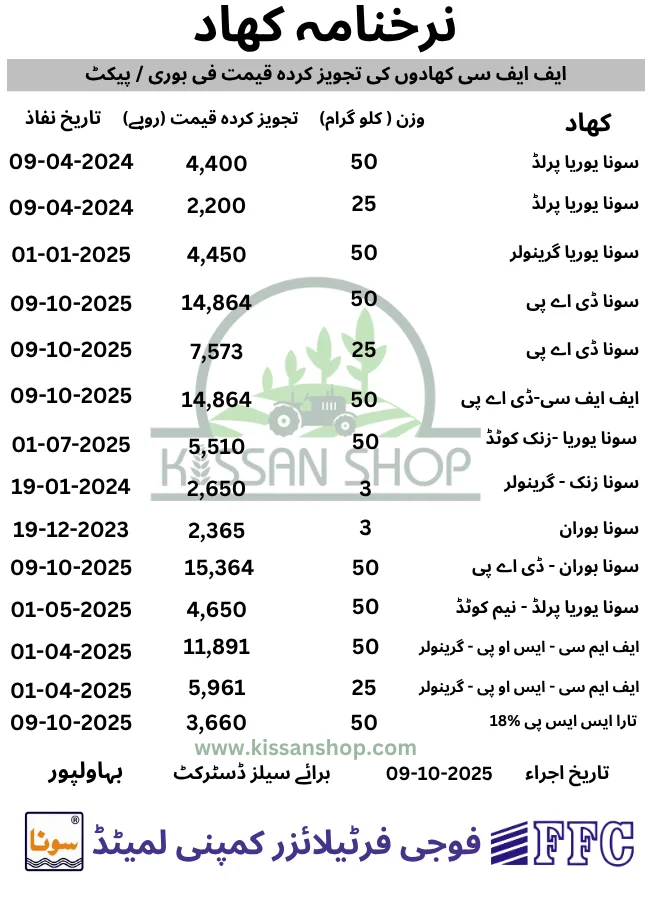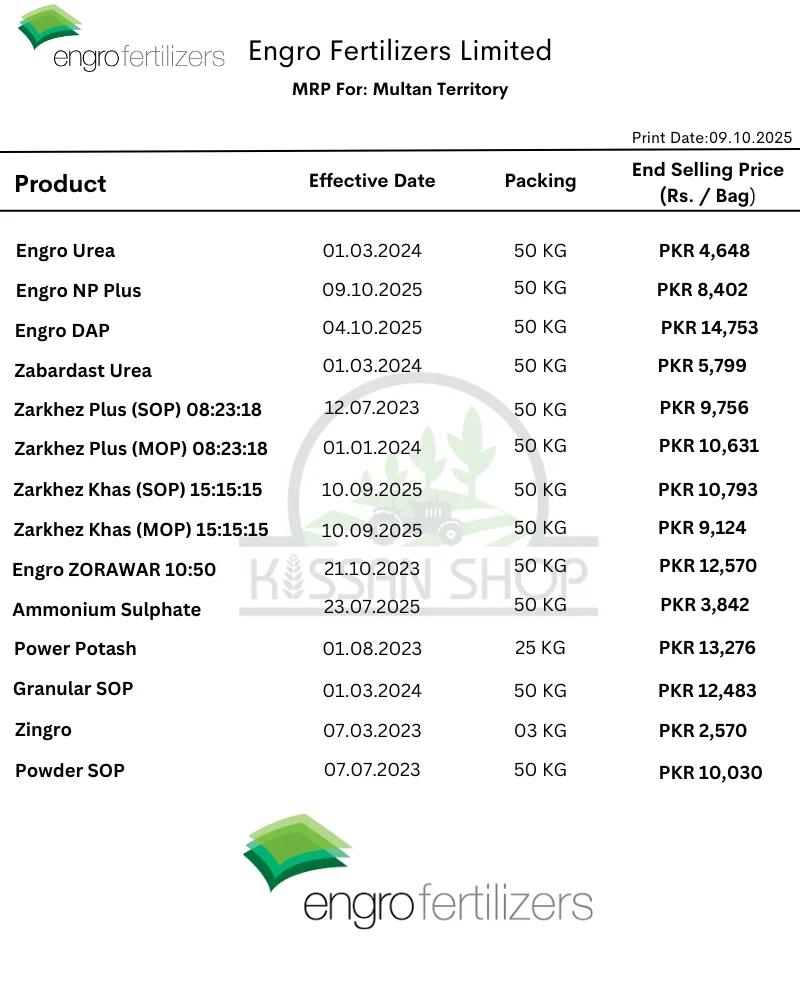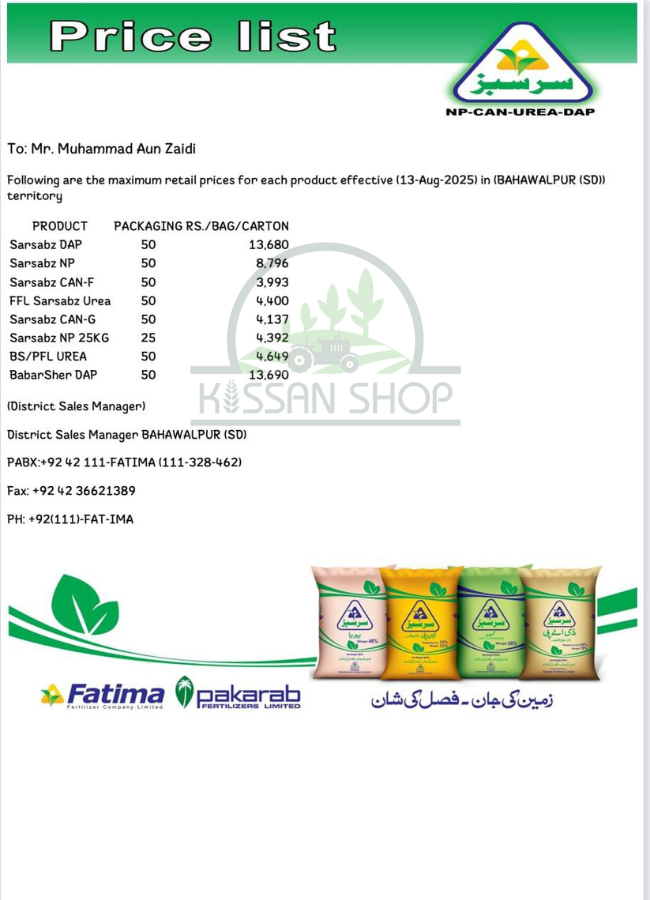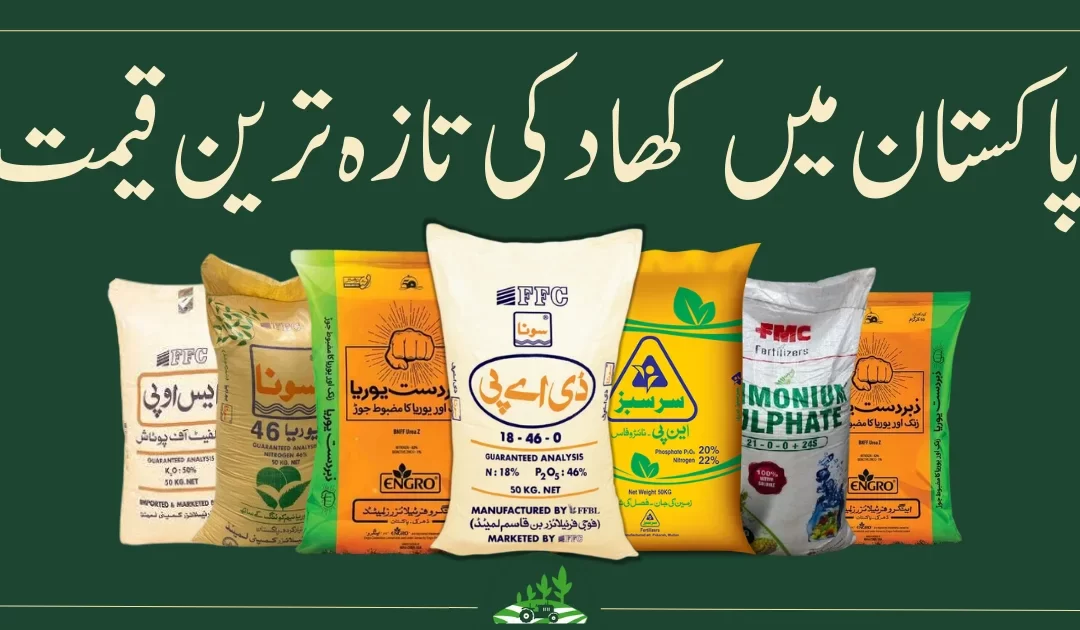Fertilizer price in Pakistan fluctuate every day, Currently, fertilizer prices mentioned include Sona DAP, Engro DAP, Sona Urea, Engro Urea, Sarsabz Gawara, Nitrophos, Potash (SOP), and some others fertilizers. Today, the Sona Urea price is between 4,350 and 4,400 Rs. And Sona DAP price starts from 13,900 to 14,000 Rs. Urea and DAP fertilizers are the most widely used among all fertilizers. For this reason, when the use of fertilizers was high, their prices would also increase a lot. During wheat cultivation, the use of these two fertilizers increases, and the fertilizer dealers sell fertilizer at a price higher than the price recommended by the government.
Fertilizer price difference from 50 to 100 Rs in the market of every city in Pakistan. Hence, two prices are given in the table below. The prices of fertilizers given in the table are given with reference to the local market. Fertilizer prices in Pakistan are following.
Today Fertilizer Price in Pakistan
In local market fertilizers not sell out on control price. Such as Sona DAP fertilizer price in Pakistan from Government is 13,995 Rs but in local Market Sona DAP price today is 13,900 Rs. Engro DAP price today is 13,850 Rs in local market.
| Fertilizer Name | Local Market Price | Local Market Trend |
|---|---|---|
| Sona DAP 50 kg | 13,900 Rs to 14,000 Rs | |
| Sona Boron DAP 50 kg | 14,450 Rs to 14,550 Rs | |
| Engro DAP 50 kg | 13,850 Rs to 13,900 Rs | |
| Sarsabz DAP 50 kg | 13,750 Rs to 13,850 Rs | |
| FFC DAP 50 kg | 13,850 Rs to 13,900 Rs | |
| Sona Urea 50 kg | 4,340 Rs to 4,400 Rs | |
| Sona Urea Zinc 50 kg | 5,200 Rs to 5,250 Rs | |
| Engro Urea 50 kg | 4,350 Rs to 4,380 Rs | |
| Sarsabz NP 50 kg | 8,700 Rs to 8,800 RS | |
| Zarkhez Plus 50 kg | 10,800 Rs to 10,900 Rs | |
| Sarsabz Can Gawara 50 kg | 3,950 Rs to 4,000 Rs | |
| Pak Arab Gawara 50 kg | 3,550 Rs to 3,600 Rs | |
| Zabardast Urea 50 kg | 5,200 Rs to 5,250 Rs | |
| FFC SOP 50 kg | 11,800 Rs to 11,850 Rs |
Latest FFC Rate List
FFC rate list from the government of Pakistan mentioned below. In local market fertilizers not sell out on control price. Such as Sona DAP fertilizer price in Pakistan from Government is 13,995 Rs. Sona Company supplies three types of urea, and all three have different prices. First sona urea pearl, second sona urea granular, and third sona urea Neem coated. The control price of sona urea in Pakistan is between 4,400 and 4,650 Rs.

Engro fertilizer price list
The new Engro fertilizer price list is mentioned below. Engro urea price according to rate list is 4,648 Rs. Engro urea price is higher as comparatively sona urea. Engro DAP price on Rate List is 13,953 Rs.

Fatima fertilizer price list
The Fatima company changed its price list and increased fertilizer prices. Sarsabz urea price of Fatima is 4,649 Rs. After increasing, the new price of Sarsabz DAP is 13,880 Rs. The Fatima fertilizer price list is also given below.

Check Also:
- Today Cotton Price in Pakistan
- Today Corn Price in Pakistan
- Today Rice Price in Pakistan
- Garlic Growing Stages
- Today Garlic Rate in Pakistan
- Today Wheat Price in Pakistan
Fertilizer Companies in Pakistan
As of my last knowledge update in September 2021, Pakistan has several fertilizer companies that play a significant role in the country’s agriculture sector. Fertilizer price in Pakistan are different in all companies. Here are some of the prominent fertilizer companies operating in Pakistan:
- Engro Fertilizers Limited: One of the largest fertilizer companies in Pakistan, Engro Fertilizers produces a range of fertilizers, including urea and phosphate-based fertilizers. They are known for their brand “Engro.”
- Fauji Fertilizer Company Limited (FFC): FFC is another major player in Pakistan’s fertilizer industry, producing various types of fertilizers. Their popular brands include “Sona Urea” and “Sona DAP.”
- Fatima Fertilizer Company Limited: Fatima Fertilizers is involved in the manufacturing and marketing of a wide range of fertilizers, including urea and phosphate fertilizers.
- Dawood Hercules Corporation Limited: This company is involved in various industries, including fertilizers. They operate under the brand name “Brite.”
- Fauji Fertilizer Bin Qasim Limited (FFBL): FFBL is a subsidiary of Fauji Fertilizer Company Limited, and it specializes in the production of di-ammonium phosphate (DAP) fertilizers.
- Pakarab Fertilizers Limited: Pakarab Fertilizers is known for producing calcium ammonium nitrate (CAN Guwara) and other fertilizer products.
- Engro Powergen Qadirpur Limited (EPQL): A subsidiary of Engro Corporation, EPQL is involved in power generation and also produces a limited quantity of fertilizer.
Please note that the fertilizer industry is subject to changes, mergers, and acquisitions, and the landscape may have evolved since my last update. For the most current information on fertilizer companies in Pakistan, it’s advisable to consult authoritative sources, industry reports, or the official websites of these companies. In local Market there are three most famous companies, first Fauji Fertilizer, second one is Engro Fertilizer and third is Fatima Fertilizer. So, fertilizer price in Pakistan of these companies is high as compare to others.
FAQs
What is the price of DAP today?
Today, the price of Sona DAP, Engro DAP, and Sarsabz DAP is between 14,600 and 14,750 Rs per 50 kg Bag. Sona DAP price is maximum as compared to other companies. Sona DAP fertilizer is preferred by farmers in the market.
What is the price of urea today?
Today, the price of Sona urea, Engro urea, and Sarsabz urea is between 4,140 and 4,150 Rs per 50 kg Bag. The usage of Sona urea and Engro urea fertilizer is more by farmers for crops. FFC urea and Engro Urea prices are almost the same. But the main difference in both companies is that Fuji Fertilizer Company produces three types of urea and Engro Company produces two types of urea.
What is the price of 50 kg sop fertilizer in Pakistan?
Sop fertilizer price in Pakistan starts from 11,800 to 11,850 Rs per 50 kg bag, according to the government rate list. Engro SOP price is 13,583 Rs and FFC SOP price is 13,638 Rs. Both SOPs are in granular form. After urea and DAP, potassium is the most important nutrient for the plant. Which is mostly ignored by farmers.
Conclusion:
Fertilizers are very important for crop, if we want to take high yield then we will applying different fertilizers. Fertilizer price in Pakistan increase in every day. Farmers are worry due to increase fertilizer price in Pakistan. Government should take action on increases fertilizer price. In local market Sona DAP Fertilizer price in Pakistan is 13,900 Rs. Sona Urea fertilizer price in Pakistan is 4,350 Rs. Sarsabz NP Fertilizer Price in Pakistan is 8,700 Rs. Sarsabz Can Gawara Fertilizer Price in Pakistan is 3,950 Rs. Zarkhez Fertilizer Fertilizer Price in Pakistan is 10,800 Rs.


Hi Aslamo alikom
My name is ismail badshah I am from Pakistan form Peshawar. I’m a small fertilizers Business man. I updated my self new fertilizer price. And how I cantact with you. Thanks for updating
Contact on whatsapp number 03000848035
Hi sir,
I need fine urea, please send me updates urea prices daily
My WhatsApp number 0307 8069189. Thanks
Sir website k oper daily rates ki updates hoti hy
Assalamualaikum, Bhai khad ka choti satah pr dokan kholni thi, holesell rate ki update kr dia kren plz
w.slam, Sir khaado k latest rates update kie jaty hai, app yaha regular check kr skty hai.
ایگریکلچر آفس تنگی میں زرعی اہلکار فی بوری کی قیمت 4100 روپئ میں فروخت کر رہے ہیں
اسکی اصل قیمت کتنا ہے؟؟
4,000 RS
Aslam o alikum Bhai Bhai main distric BWN city Marot say hun mughy 12 Sona urea aur 4 DAp Ki punch Yahan kitny main Milly ge please ye to bta dain
Sorry sir hm delivery nahi krty,Thanks
Aslam o alikum Bhai
Bhai mughy 12 urea aur 4 DAP marot city say 15 km agy punch pay kiss rate pay Milly ge
Sir hm delivery nahi krty,shukriya
Uria ka rate bare ga ya peeche jae plz inform
Zyada hony k chances hai
Aslamo Alikum Iam from pakistan disst Sujawal ,Sindh i want buy urea plz give me your whatsapp online booking order no.
03000848035
awesome
Thanks sir
Aoa sir, govt ki concentration ki wja se Sona DAP aor Urea prices is saal same rahen gi ya barhen gi. Please guide
same rehny k hi chances hai,